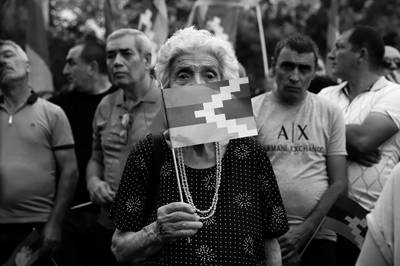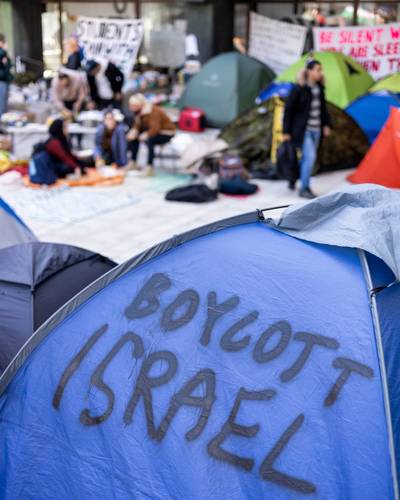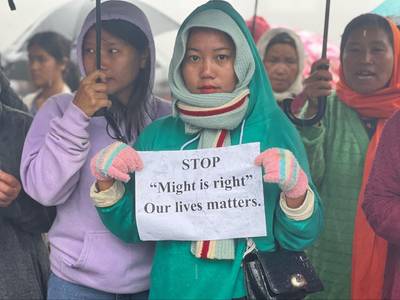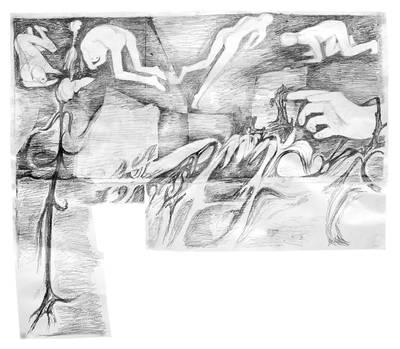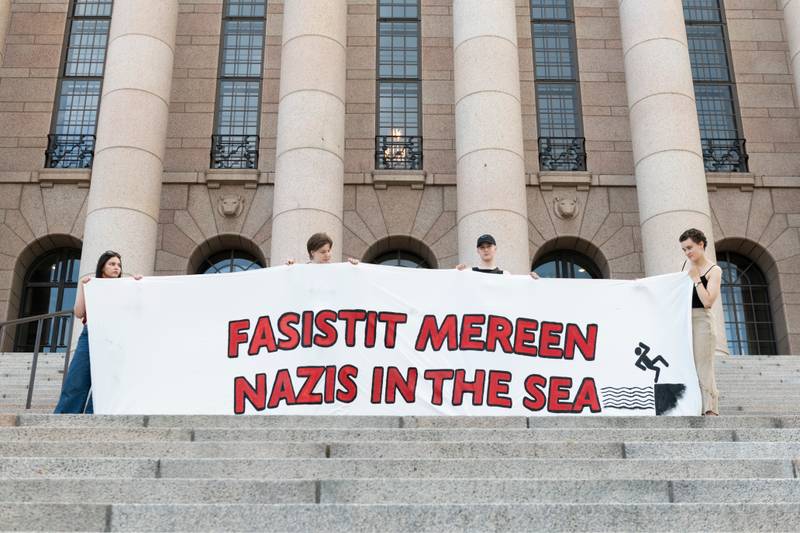

No Confidence Protest June 28th, 2023, Helsinki, Image: Jussi Eskola
Arvind Ramachandran is an immigrant from India who moved to Finland to study and stayed after to work. He has been involved in various initiatives working towards a more equal Finland. He dreams of a vibrant, multilingual, multi-ethnic, progressive, and inclusive Finnish society, where race, origin, gender, sexual orientation, age, class position, and other personal attributes do not affect one’s possibility of living a good life. He was a Left Alliance candidate in the 2021 local elections in Helsinki and is constantly exploring ways to build solidarity and political power among minorities. Arvind can be reached at arvind@arvind.cc.
“Nothing is more important than stopping fascism, because fascism is gonna stop us all.” ― Fred Hampton
June 20, 2023, will go down in history as one of the saddest days in the history of what some people still like to call the world’s happiest country. Finland’s most right-leaning government to date, headed by Prime Minister Petteri Orpo from the National Coalition Party (NCP), was sworn into power just in time to cast a pall over the midsummer holiday. What makes this government uniquely dangerous is the extent to which the far-right Finns Party’s racism goes hand in hand with the neoliberal National Coalition Party’s cruel determination to go after the working class with their extensive cuts – a lose-lose situation for immigrants and locals alike, despite election promises to the contrary made by both parties.
For those unfamiliar with the Finnish political landscape, the Finns Party’s leaders have links to neo-nazi movements, are known for their racist writings, spew hatred towards minorities any chance they get, and have even been convicted in court for ethnic agitation. Two of their three partners-in-government, the National Coalition Party, the Swedish People’s Party, and the Christian Democrats, like to call themselves “liberal” and “progressive.” Yet, even the government’s staunchest supporters cannot deny the plan is to make a country that is already one of the most difficult places to be a person of immigrant origin even more racist, discriminatory, and unequal than it already is.
Increased length of residency, new language and citizenship tests for acquiring permanent residency and citizenship, near impossible time limits for finding a new job if laid off, and raising of minimum income requirements for immigration all make it clear that the right-wing coalition wants to make life as an immigrant in Finland as difficult as possible.
The effect of the far-right’s takeover on life in Finland
The ruling coalition’s government programme, which sets goals for the next four years, was hammered out in unprecedented secrecy. Reading the programme, entitled “A strong and committed Finland”, makes the reasons for the lack of transparency clear. The document conquers new frontiers by not only showcasing how pressure on immigrant communities will be intensified under the new regime, but also laying out a roadmap for a systematic dismantling of the welfare state, one that has already been weakened over the last few years through extensive privatization and haphazardly implemented reorganization.
We, as immigrants in Finland, are much more likely to face challenges in everything from finding employment to accessing basic services and getting a roof over our heads. By attacking us on multiple fronts, first through the inhuman tightening of immigration requirements and then through cuts in social support, it is clear the government wants to accelerate the stratification of Finnish society. This is an unfortunate path to go down for a country that some are still intent on touting as being among the best in the world.
Increased length of residency, new language and citizenship tests for acquiring permanent residency and citizenship, near impossible time limits for finding a new job if laid off, and raising of minimum income requirements for immigration all make it clear that the right-wing coalition wants to make life as an immigrant in Finland as difficult as possible. The message to all of us immigrants here is, in the words of the Minister of Interior Mari Rantanen, who was recently forced to disown her references to right-wing conspiracy theories about population replacement: “We will tighten all the conditions to come to Finland, to stay here, and to be in Finland.” Thanks to such leaders and their disgustingly narrow-minded ideas, Finnish society is headed towards a future where we immigrants will be tolerated even less, forced even more into low-wage occupations, and never really included, let alone respected, as equal members of society.
The debilitating effects of this new government’s proposals go far beyond their clearly racist immigration plans. From cutting housing benefits to unemployment support, doing away with funding for adult education, to reducing sick day eligibility, it is clear Finland’s newly installed leaders want to squeeze vulnerable groups, Finns and foreigners alike, to an extent that will make everyday life in this country more challenging across the board. Implementing age-old divide and conquer tactics, they have convinced voters that extensive cuts are an absolute necessity, ensuring one group blames the other for their lot, instead of uniting against the unholy coalition of racists and capitalists that continue to worsen this widespread suffering in the first place.
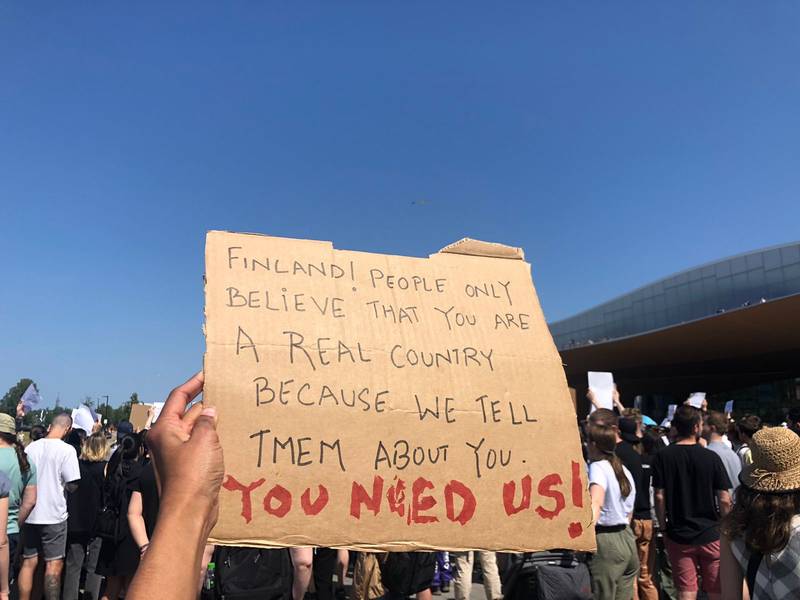

Demonstration organized by working immigrants living in Finland, including IT professionals, doctors, and academic staff, June 18, 2023, Helsinki, Image: Shubhangi Singh
Trying to earn the respect of the far-right is a dangerous game
What demagogic leaders do best is convince voters that some people are inherently worth more than others and, by default, deserve a better life. They achieve this by first pitting locals against immigrants, and then immigrants against each other. In a climate of clear hatred for all immigrants, assuming that one can escape discrimination by choosing “respectability” and behaving as a “model minority” can seem like a straightforward choice. This assumption has been visible in some of the protests organized immediately after the new government program was made public. Many of us turned up with placards expressing how much we “love Finland,” how we are “educated,” and “pay our taxes,” and thus are deserving of better treatment as “contributing members of Finnish society.”
To willingly drive a wedge between ourselves and “other” immigrants is to fall into the trap of thinking we can fight racism with respectable behavior. Toni Morrison captured the essence of racism perfectly when she said, “The very serious function of racism is distraction. It keeps you from doing your work. It keeps you explaining, over and over again, your reason for being.”1 Performing the good, grateful immigrant” role will not save anyone, for the far-right is not interested in changing their opinions based on our actions but only in holding onto power using our “otherness” as an excuse. We all deserve decency, dignity, and respect simply because we live in Finland, whether by choice, chance, or necessity, and no other justification is required to demand this bare minimum.
When considering Prime Minister Orpo’s far-right government, whose actions are already causing racism to become further entrenched in Finnish society while accelerating the dismantling of the welfare state on an unprecedented scale, the question is not one of differing political viewpoints but a more fundamental consideration of who is perceived as human and deserving of equal rights.
Any doubts about how racist, fascist, and downright dangerous the current government is should have been cleared up by now, thanks to the incredible work done over the summer by journalists, researchers, and laypersons. Multiple instances of hate speech and incitements to violence by high-ranking government members over the last few years, including senior ministers, have been uncovered in less than a month since the new government was inaugurated. Each week has brought more shocking behavior to the limelight, followed by an almost farcical public call for an apology from the “liberal” coalition partners, hastily issued a non-apology, and consequent convenient shifting of the lowering of the threshold for government cooperation by said liberal partners.
To provide just a few examples, Deputy Prime Minister and Minister of Finance Riikka Purra dehumanized burqa-wearing Muslim women by calling them “black sacks” (mustat säkit in the original Finnish) in her blog post from 2019. She also fantasized about shooting immigrant children in commuter trains in a post in 2008 on an internet blog run by the current parliament speaker, Jussi Halla-Aho, himself convicted earlier for inciting hatred against an ethnic group. The short-lived ex-minister of economic affairs, Vilhelm Junnila, was widely condemned for his associations with neo-Nazi groups. His replacement, Wille Rydman, has his own history of disrespecting and demonizing people of immigrant origin.
Even one of these instances would have been enough to shake things up in the corridors of power just a few years ago. That all of this is now normalized and given a free pass not only shows us the extent of the rot that plagues the ruling coalition but also gives us an idea of both the necessity and the extent of solidarity and collaboration that would be required to stop the rot.
The current Finnish government owes its existence to systematically spreading hatred and division. It is imperative that we unite in demanding the end of this government and refuse to settle for anything less. To try and negotiate with such “leaders” is to give fascism a free pass in return for their reluctant acceptance of us as unequal members of Finnish society. Irrespective of how long we have called this country home, how closely we follow Finnish politics, and how much the new far-right government’s policies will affect us and our loved ones, now is the time for each one of us immigrants in Finland to ask ourselves the following question: Is this who we really are? Is this who we want to be? Enablers of the rise and strengthening of the far-right?
Respecting people’s choice and allowing fascism a free run are not the same thing
Over the last couple of decades, the Finns Party and other far-right movements have exploited increased migration to cultivate an atmosphere of hatred and thus consolidate support. As this was happening, “less extreme” parties were happy to wait and watch and then conveniently change tunes about their willingness to work with the far-right purely based on election arithmetic. While analyzing what went wrong is important, the need of the hour is to ensure we do not remain silent spectators as the government actualizes their bucket list of wishes for an even less equal and even more exploitative Finland. Martin Luther King Jr. talked about the arc of the moral universe bending towards justice in the long-term. It is clear that left alone, forces like the ones we currently have in government will do all they can to ensure it bends the other way.
For the vast majority of us, on the other hand, years of suffering with life-long impacts are not an exciting exercise in political adventurism but an actual threat to our immediate and long-term well-being that needs to be rooted out before it is too late.
Finland is supposedly a country where human rights are respected, and equality is guaranteed, to such an extent that one shoddy government cannot wreak much havoc. Voices belonging to this school of thought, the loudest of which emanate from the very top of the government, argue that the threat they pose is overblown, past “mistakes” should not be dredged up, the people’s choice needs to be respected, and that the far-right and their enablers need to be allowed to “get to work” and run the country with the mandate they received in the parliamentary elections.
What is conveniently forgotten in calls for respecting the “people’s choice” is that the elections were incredibly tight. The ruling coalition barely cobbled together a parliamentary majority to form a government. The parties from the previous governing coalition won precisely half of the 200 parliamentary seats, making the elections more of a tie than a landslide for the right. The party received 20.1% of the votes cast in an election where the turnout was 72%, bringing the percentage of members of Finnish society that actually voted for their racism to a paltry 11%. Add to this the NCP, which got the most seats in the elections but refused to side with the Social Democrats to form a less extreme coalition and instead decided to accept outright racism as long as their planned cuts were greenlit. And to finish off, we have the two smaller parties that seem more interested in not rocking the boat than actually living up to their values, creating a toxic cocktail that will impact minorities and the marginalized in Finland for decades.
Questioning and opposing the fascists and bigots in power, is not disrespecting the people’s choice but ensuring a more inclusive society is possible in the future, even if such a reality never actually existed in the past under multiple governing coalitions. People questioning government policies, whether on social media posts or in grassroots demonstrations, are engaging in a legitimate expression of public opinion, just like the ones who, thanks to age and citizenship being in their favor, were able to vote.
Another prominent point of view seems to be one that says letting the far-right wield power would show people how incapable they are, thereby reducing their support by the time the next elections come around. This solution might work for the privileged few, those falling into the right income groups or holding the right passports, whose lives will improve under the new government, for example, due to tax breaks, or at least stay unchanged. For the vast majority of us, on the other hand, years of suffering with life-long impacts are not an exciting exercise in political adventurism but an actual threat to our immediate and long-term well-being that needs to be rooted out before it is too late.
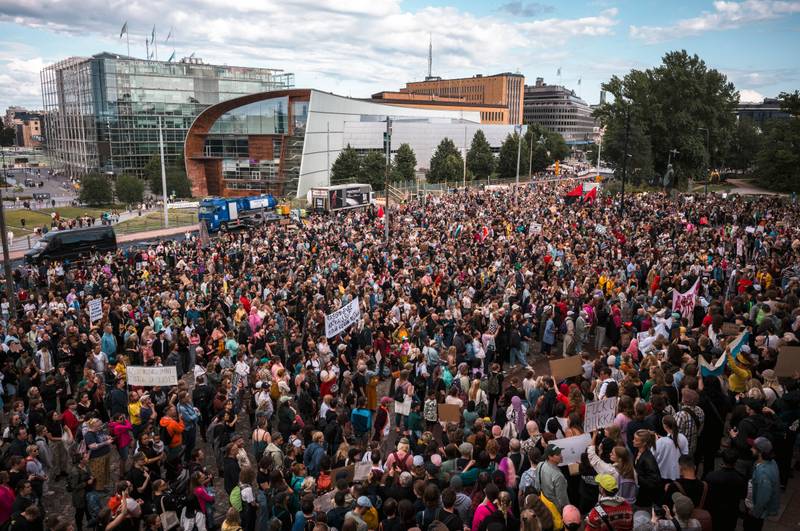

Nolla Toleranssi Protest, July 19, 2023,Helsinki, Image: Antti Yrjönen
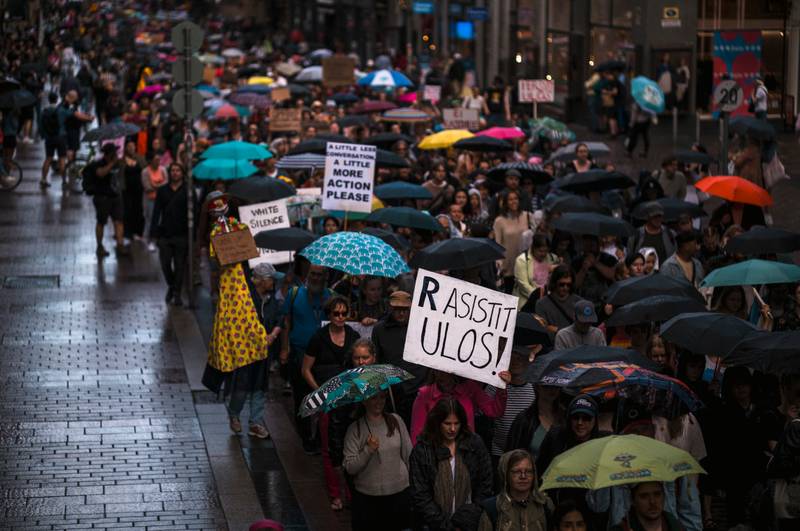

Zero Tolerance Protest, Helsinki, July 19, 2023, Image: Antti Yrjönen
From staying silent to speaking up, from speaking up alone to standing together
Few things are as inspiring as realizing how much potential for positive change exists in people choosing to unite, speak truth to power, and demand accountability from those convinced they can do as they please under the cover of providing stable governance. That so many exasperated members of Finnish society – immigrants and citizens, newcomers and seasoned campaigners, those directly affected by these new proposals, and those joining in solidarity – have decided enough is enough and started protesting against the inhuman far-right government is a laudable development indeed. It is especially heartening to see that despite being recent immigrants to Finnish society, with our differing life situations and the multiple challenges they bring, and with many of us only starting to understand the politics of our host country, we have decided to not stay silent any longer.
What will make our individual frustration and our fledgling movements even more powerful is finding ways to align them with struggles against discrimination and ill-treatment in Finland that have a longer history. The struggle of the indigenous Sámi for self-determination, the Roma community standing against discrimination in Finnish society, asylum-seekers fighting for a more humane immigration policy, the negligence towards guaranteeing equal rights and support to persons with disabilities, and the victims of human trafficking asking for basic rights guaranteed under Finnish law – opposition to injustice has existed for as long as the Finnish state has operated in unjust ways.
The euphoria that the widespread opposition and spontaneous movements of summer 2023 brought about has not been devoid of disappointment. Public criticism of the government has often been sidetracked to focus more on how news coming from this government has negatively impacted Finland’s previously progressive image on the world stage, one that has not always been completely deserved. Concerns about how a minister like Vilhelm Junnila would indirectly affect international trade have overshadowed discussions of the direct impact of such decision-makers on the lives of already marginalized members of Finnish society. This conveys to minorities and essentially everyone else who will suffer under the new system that Finnish society is more concerned with “mitä meistä sanotaan” (Finnish for “what will people say”) than it is with the actual harm that results from allowing this government to operate unchecked. Respecting human rights is fundamental and non-negotiable, not something we demand only when the country’s brand or export performance is threatened.
What will make our individual frustration and our fledgling movements even more powerful is finding ways to align them with struggles against discrimination and ill-treatment in Finland that have a longer history. The struggle of the indigenous Sámi for self-determination, the Roma community standing against discrimination in Finnish society, asylum-seekers fighting for a more humane immigration policy, the negligence towards guaranteeing equal rights and support to persons with disabilities, and the victims of human trafficking asking for basic rights guaranteed under Finnish law – opposition to injustice has existed for as long as the Finnish state has operated in unjust ways. Our solidarity doesn’t need to stop with other ethnic minorities but can act as a tool to bring everyone together, irrespective of background, who is set to suffer under the new regime – from the exploited worker to the overworked parent, from the retiree dependent on housing support to the employee looking for a career change – a number easily far higher than the votes the ruling coalition managed to rake in.
With this new government, it is clear that most of us are in the same precariously poised boat. It is up to us to resist these efforts, to not just keep the already weakened Finnish welfare state afloat but demand substantial improvements instead of hoping we can convince the racists to throw us a few lifeboats to save our individual selves while the masses sink deeper.
As the Finnish expression goes, “Torilla tavataan” - “Let’s meet at the square”, in unity, empathy, and solidarity this time!
